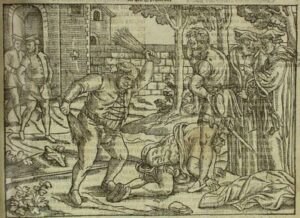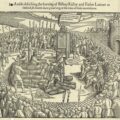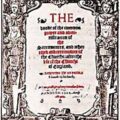- On the 5th September 1569, Edmund Bonner, the Bishop of London and a man nicknamed “Bloody Bonner”, died in prison.
Wood cut of Bonner punishing a heretic from John Foxe’s Book of Martyrs (1563) Bonner was a lawyer and priest and he entered the service of Cardinal Wolsey in around 1525. He rose from being Wolsey’s chaplain in 1529 to being the King’s agent in Rome in the early 1530s when Henry VIII was trying to get the Pope to agree to the annulment of his marriage. Bonner was also instrumental in the publication of Henry VIII’s “Great Bible” in English and was close to both Thomas Cromwell and the King. He became Bishop of London in 1540.
Although he had been instrumental in the Break with Rome and had willingly taken the Oath of Supremacy, he was not a reformer and so opposed the Protestant reforms introduced by Protector Somerset in Edward VI’s reign. He openly opposed the first Act of Uniformity and the Book of Common Prayer and was imprisoned and deprived of his bishopric in late 1549.
Bonner was still in prison in 1553 when Mary I claimed the throne. Mary had him released and his bishopric was restored and he became the person in charge of stamping out heresy in London. In 1555, he began ordering the burnings of reformers, people he viewed as heretics, and it was his role in these persecutions which gave him the name “Bloody Bonner”. John Foxe, in his “Book of Martyrs” (or Actes and Monuments) wrote of Bonner:-
“This cannibal in three years space three hundred martyrs slew
They were his food, he loved so blood, he sparèd none he knew.”However, the New Advent Catholic Encyclopedia gives the number of deaths as 120, rather than 300, and some people feel that Bonner has been unfairly maligned and point out that he was simply following orders. He was also actually rebuked by Mary I’s government for not prosecuting enough heretics.
On the 17th November 1558, Mary I died and Elizabeth I replaced her as Queen of England. Elizabeth was of a reformist persuasion and in summer 1559 Mass was forbidden and only services following the Book of Common Prayer were allowed in English churches. Bonner refused to comply and also refused to take the Oath of Supremacy, so he was ordered to resign his bishopric and was imprisoned in Marshalsea in April 1560. Although he was indicted on a charge of praemunire in April 1564 and many were pushing for his execution, he died in prison on the 5th September 1569 and was laid to rest in St George’s, Southwark. Some sources suggest that his coffin was removed to Copford, near Colchester, a manor held by Bonner as Bishop of London.
Sources and Further Reading



